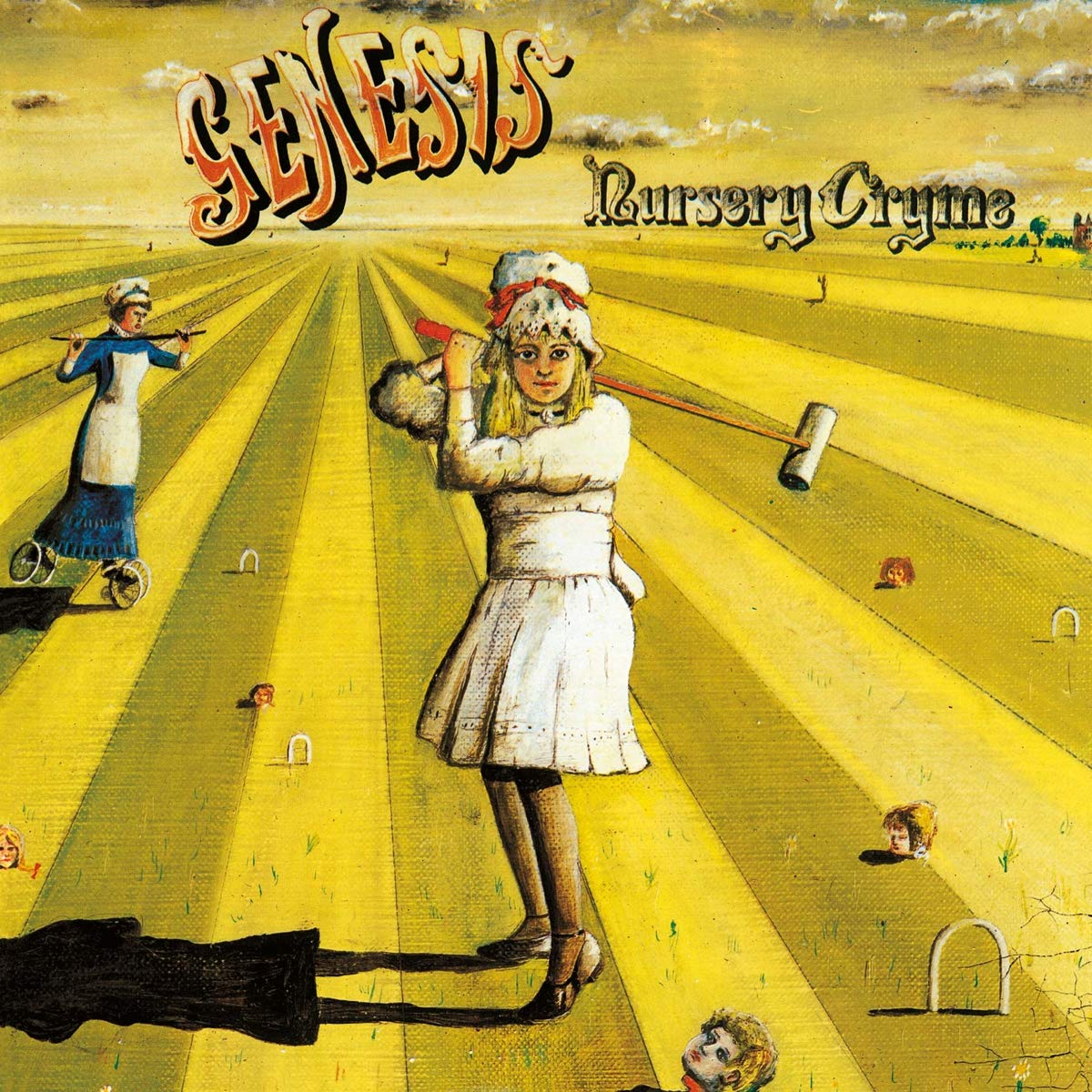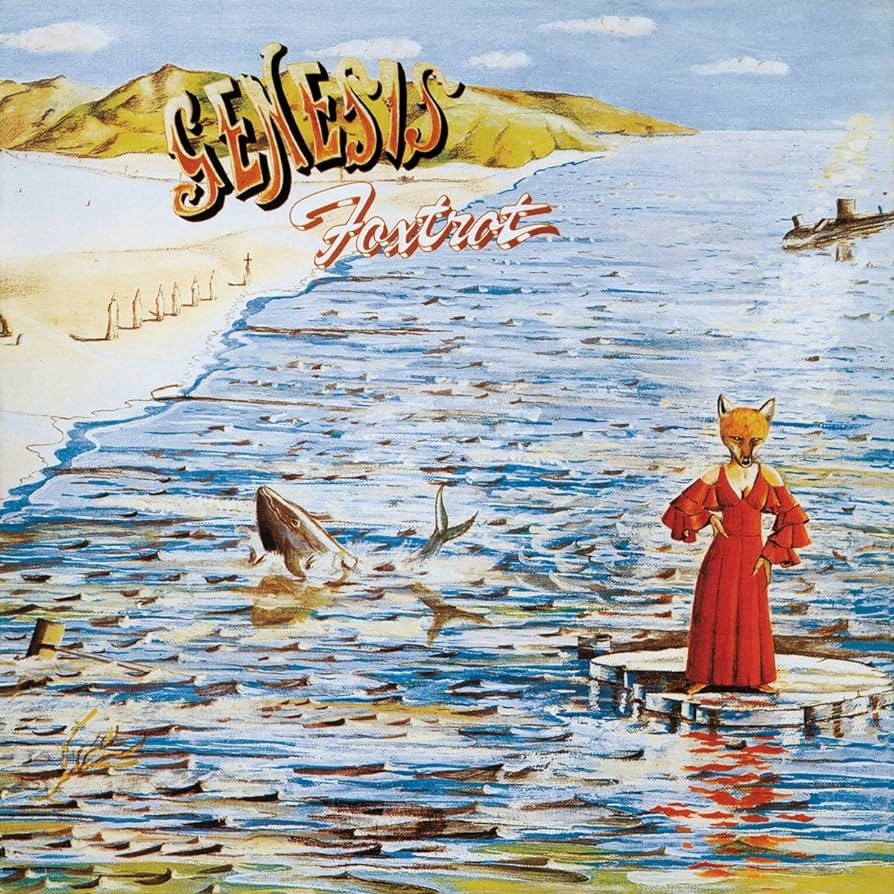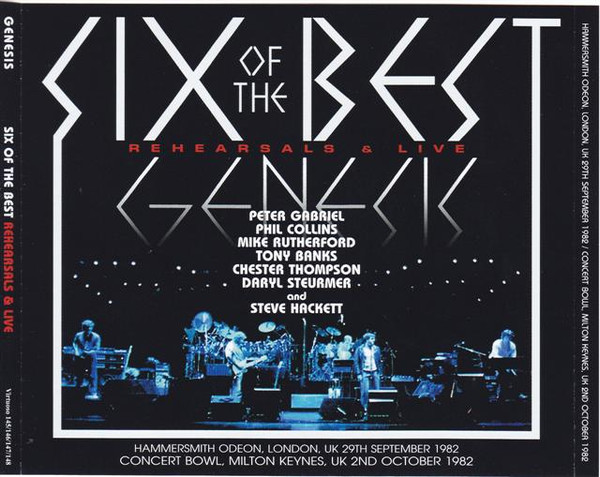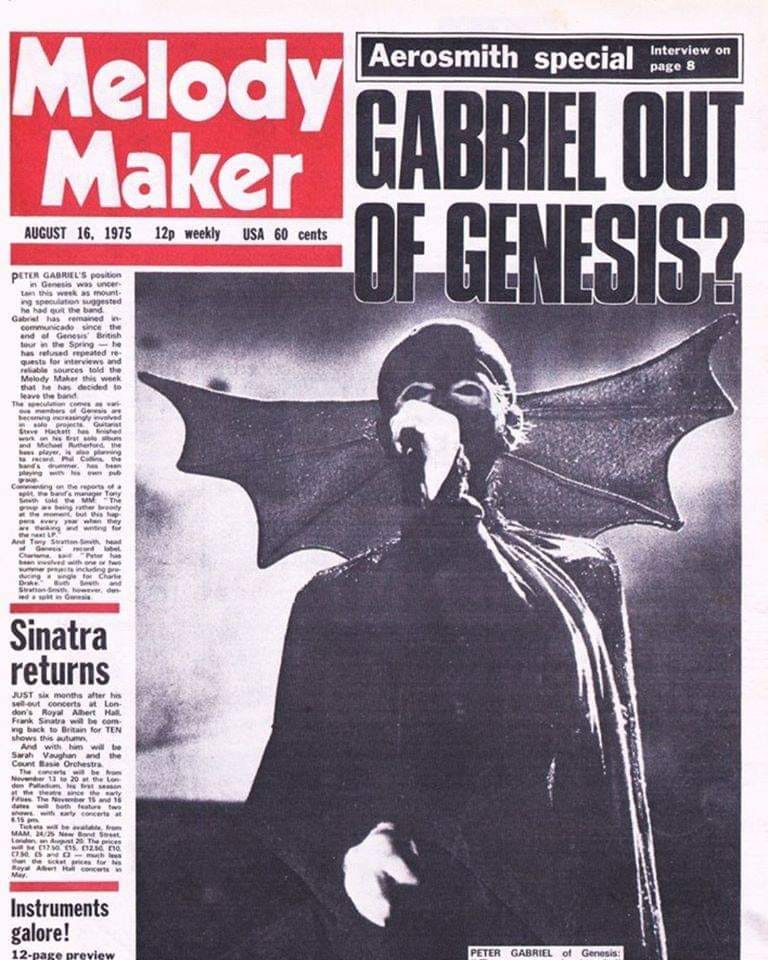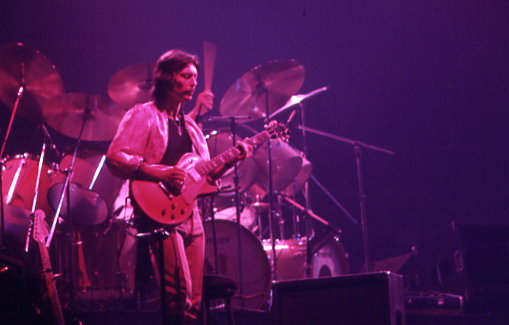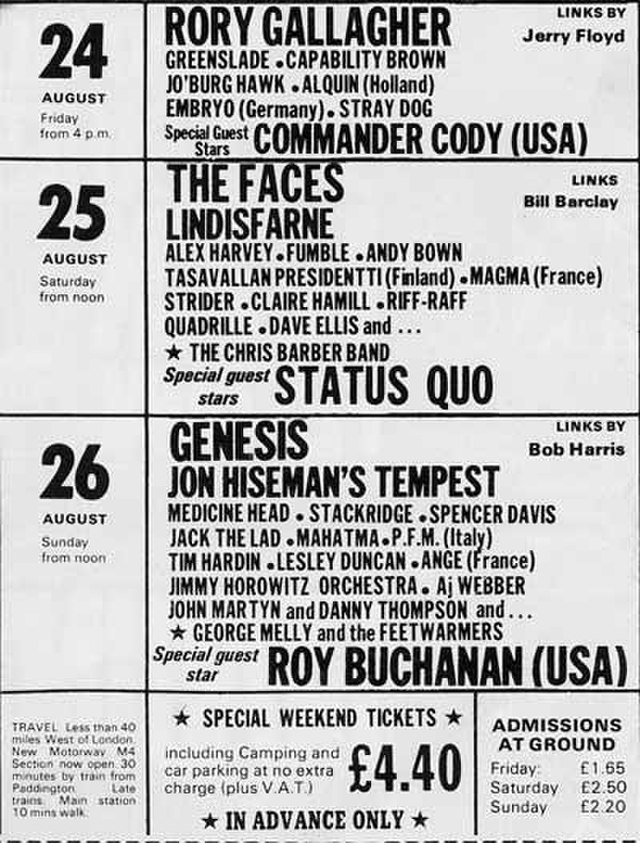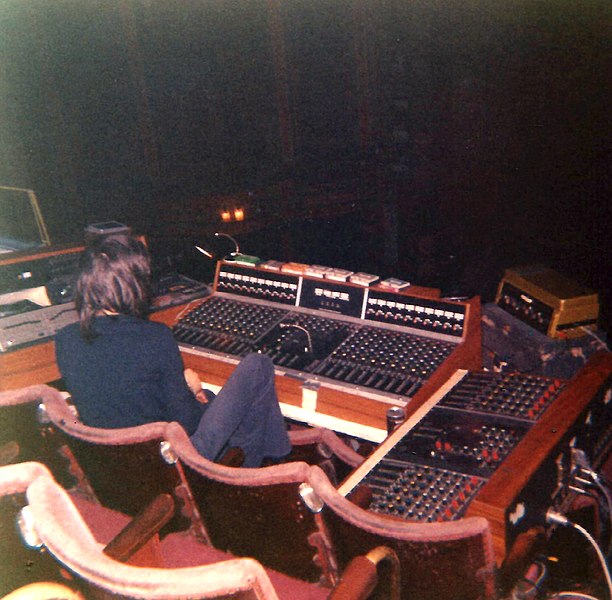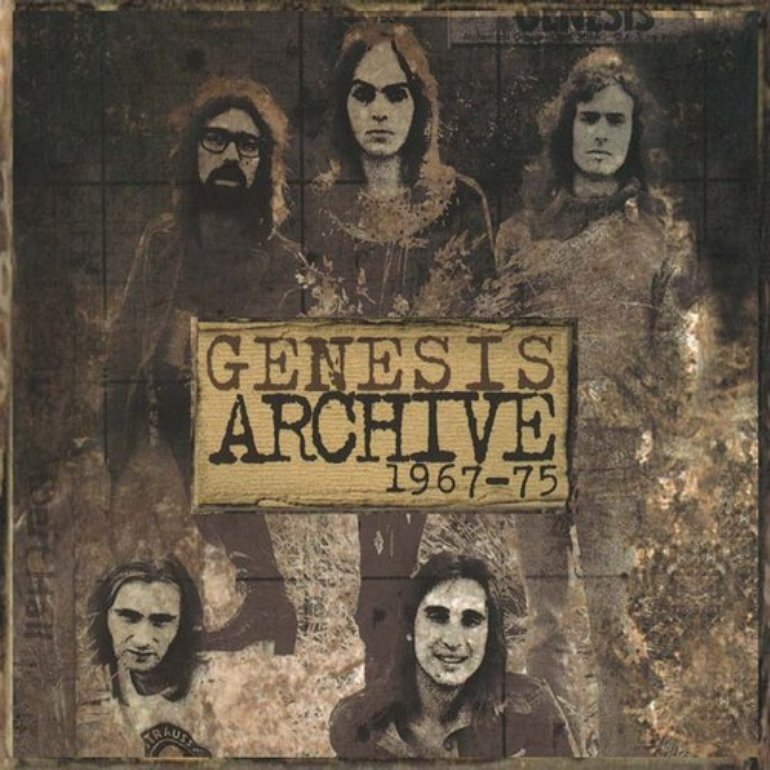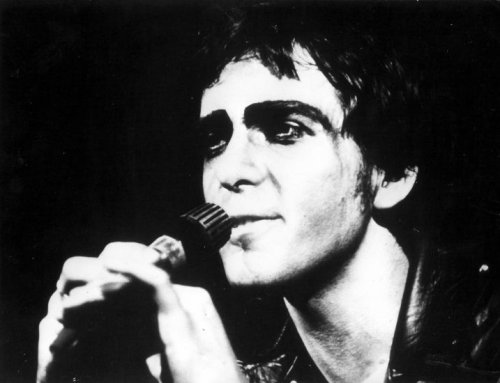In November 1971, Genesis released Nursery Cryme, their third studio album and a turning point in their musical evolution. It marked the arrival of guitarist Steve Hackett and drummer Phil Collins, whose contributions would shape the band’s signature progressive rock sound.
Continue reading “Nursery Cryme (1971) – Genesis”Trespass (1970) – Genesis
Genesis’s second album, Trespass, marked a turning point in their musical journey. Released in October 1970 on the Charisma label (and on ABC Records in the US), the album showcased a band finding its identity, blending folk, rock, and soul in ways that set them apart from their contemporaries. Recorded at Trident Studios in London under the guidance of producer John Anthony, Trespass was a bold step forward for Genesis, a band on the brink of discovering their iconic sound.
Continue reading “Trespass (1970) – Genesis”Foxtrot (1972) – Genesis
It’s the year 1972. Genesis had released Nursery Cryme the year before and had played their first show overseas in Brussels in early 1972. Several shows in Europe followed and after their return to the UK, they began writing their next album Foxtrot, which, for many fans, would become their ‘progressive’ high point.
Continue reading “Foxtrot (1972) – Genesis”Six Of The Best
On October 2, 1982, the legendary ‘Six Of The Best’ reunion show with Peter Gabriel and Genesis took place at Milton Keynes.
Continue reading “Six Of The Best”‘Gabriel Out Of Genesis?’ – Melody Maker 16th August 1975
The Melody Maker rumoured in its edition of 16 August 1975 about Peter Gabriel’s departure from Genesis.
Peter Gabriel left the band after the 1975 tour
After the The Lamb Lies Down On Broadway tour in 1975, lead singer Peter Gabriel left Genesis. The band did not announce his departure right away, but instead went into the studio to record what became their next album A Trick of The Tail and audition new singers. By August 1975, the press had heard rumours about Peter Gabriel’s decision to leave Genesis. On 16 August, the Melody Maker put a picture with him wearing the batwings on the cover and featured the headline GABRIEL OUT OF GENESIS?
Here’s the text from the Melody Maker’s front page:
GABRIEL OUT OF GENESIS?
PETER GABRIEL’S position in Genesis was uncertain this week as mounting speculation suggested he had quit the band.
Gabriel had remained incommunicado since the end of Genesis’ British tour in the Spring – he has refused repeated requests for interviews and reliable sources told the Melody Maker this week that he has decided to leave the band.
The speculation comes as various members of Genesis are becoming increasingly involved in solo projects. Guitarist Steve Hackett has finished work on his first solo album and Michael Rutherford, the bass player, is also planning to record. Phil Collins, the band’s drummer, has been playing with his own pub group.
Commenting on the reports of a split, the band’s manager Tony Smith told the MM: “The group are being rather broody at the moment, but this happens every year when they are thinking and writing for the next LP.“
And Tony Stratton-Smith, head of Genesis’ record label, Charisma, said: “Peter has been involved with one or two summer projects including producing a single for Charlie Drake.” Both Smith and Stratton-Smith, however, denied a split in Genesis.
Genesis manager Tony Smith first denied the rumours, but a week later, the band announced it officially and explained that they were searching for a new singer. Hardly did they know that the singer was already in the group: Their drummer Phil Collins. But that’s another story.
Title photo: Melody Maker 16 August 1975: Gabriel out of Genesis?
Steve Hackett’s Last Show with Genesis
On July 3, 1977, Genesis played the final show of their Wind & Wuthering tour, unaware that it would also be Steve Hackett’s last performance with the band.
Wind & Wuthering and Growing Tensions
Released in December 1976, Wind & Wuthering was Genesis’s second album following Peter Gabriel’s departure. With Phil Collins now stepping confidently into the role of lead vocalist, the band had successfully reinvented itself as a four-piece. Collins had already proven he could carry the frontman role with A Trick of the Tail and the subsequent 1976 tour.
By this point, songwriting duties were largely shared between Tony Banks and Mike Rutherford, while Phil focused more on arrangements and performance. Steve Hackett, however, was growing increasingly frustrated. He felt that his musical ideas were often overlooked, and after the 1977 tour, he made the decision to leave Genesis.
The Wind & Wuthering Tour
The 1977 tour was one of Genesis’s biggest yet, taking them across Europe, the US, and for the first time, South America. They were joined by American drummer Chester Thompson, who would become a fixture in the live lineup for decades.
That year, the band reached new heights in live performance and was even voted “Best Live Group” in 1977. Much of that era’s power was captured on the double live album Seconds Out.
The Final Show: July 3, 1977, Munich
Genesis closed out the tour with a concert at Munich’s Olympiahalle. They opened with Squonk, followed by One for the Vine, a Tony Banks epic from the new album. The rare track Inside and Out from the Spot the Pigeon EP was also included, having appeared on select European dates.
Highlights of the show included The Carpet Crawlers, I Know What I Like, and Supper’s Ready, songs that had evolved significantly since Gabriel’s departure. The band had also begun experimenting with medleys, a trend that continued on this tour: Dance on a Volcano merged seamlessly into Los Endos, while The Lamb Lies Down on Broadway was paired with the climactic ending of The Musical Box.
And of course, Firth of Fifth made the setlist, featuring Hackett’s iconic guitar solo. None of the fans, or even the band members, knew it would be the last time they’d see Steve Hackett perform it live with Genesis.
Steve Hackett’s Departure
Steve had already released a solo album by this point, showcasing ideas that had not made it onto Genesis records. During the four-piece era, he had pushed for a guaranteed portion of writing credits on each album, a request the others declined, committed as they were to being a fully democratic group.
In July 1977, while mixing Seconds Out, Hackett found himself exhausted by the constant repetition of songs like I Know What I Like. After months on the road and in front of crowds of 20,000 people, he began to feel creatively stifled. The challenge was gone.
So one day, he picked up the phone and called Mike Rutherford to say he was leaving. Mike, aware of Steve’s growing dissatisfaction, did not try to change his mind.
Shortly afterward, Phil Collins happened to drive past Steve near Trident Studios, where they were mixing the album. Phil invited him into the car, but Steve acted strangely, saying only, “Talk to Mike, he’ll explain,” before walking away. When Phil arrived at the studio, Mike and Tony told him Steve had officially left the band.
The Band Carries On
Genesis continued mixing Seconds Out as a trio, then returned to the studio to begin work on their next album. From this point forward, Genesis would remain a three-piece studio band, while Steve Hackett would embark on a successful solo career.
Title photo: Genesis Steve Hackett. Source: Wikimedia Commons, Jean-Luc / CC-BY-SA-2.5 (https://creativecommons.org/licenses/by/3.0). Originally posted to Flickr as Genesis.
Genesis at Reading Festival 1971
Peter Gabriel performs with a broken ankle – and Genesis gain new fans
On 26 June 1971, Genesis performed at the Reading Festival for the very first time. Back then, they were still low on the bill, sharing the lineup with artists such as Lindisfarne, Terry Reid, Renaissance and Sha Na Na. Like many festivals, it came with its share of challenges: rain, mud, and even an unexpected police squad, but Genesis had a unique complication of their own: Peter Gabriel had recently broken his ankle.
The accident at Friars Club
Just a week earlier, on 19 June, Genesis had played a show at Friars in Aylesbury. During the encore of The Knife, Gabriel, always the theatrical frontman, leapt off the stage into the crowd. Unfortunately, the audience parted rather than caught him. He hit the floor hard and fractured his ankle.
Despite the injury, the band pressed on. Gabriel famously performed at least one subsequent gig in a wheelchair at an art college in Lincoln. Richard Macphail, Genesis’s tour manager and longtime friend, recalled the chaos:
‘And it scared the pants of me, because the stage was like a traditional theatre stage that sloped towards the audience. He was wildly cavorting in this wheelchair on this stage. I thought he was going to fall off the stage and break his neck!’1
Thankfully, he did not and just a few days later, Genesis took the stage at Reading.
Reading Festival in 1971
The 11th National Jazz and Blues Festival was held in Reading for the first time in 1971. The festival had previously moved between locations including Richmond, Windsor, Sunbury, and Plumpton due to local complaints. That year, it finally found a home in Reading, taking place at the Thames-side Arena on Richfield Avenue, over 25–27 June.
The event was rebranded as the Reading Festival of Folk and Progressive Music, with a ticket for Saturday, 26 June, priced at just £1.50. Although Reading Festival is typically held in August today, it’s unclear why it took place in June that year, perhaps due to the town’s 1000th anniversary celebrations, which had helped organizer Harold Pendleton gain approval from the local council.
Sharing the stage with Charisma labelmates
Genesis were not the only Charisma Records act at Reading in 1971. Lindisfarne, Van der Graaf Generator, Bell & Arc, and Audience also performed, alongside other notable names like Arthur Brown, Rory Gallagher, Wishbone Ash, Osibisa, and Ralph McTell.
Genesis played mid-afternoon on the festival’s second day. Despite their relatively low billing, their set was highlighted as one of the standout performances of the weekend. The impact was strong enough that they were invited back in the following two years.
A new era: Genesis and the festival circuit
That summer marked the beginning of Genesis’s appearances at outdoor rock festivals. Steve Hackett later recalled that it rained nearly every time they played an outdoor show in England or Europe, turning every venue into a mud bath.
At Reading, technical issues added to the frustration. Power fluctuations made it nearly impossible to keep instruments in tune. The organ was already difficult to manage, and the Mellotron, notorious for its fragility, was even worse. Their twelve-string guitars, tuned backstage, were often already out of tune by the time they hit the stage and tuning a twelve-string in front of a festival crowd was nearly impossible.
Not made for festivals?
Looking back, Tony Banks admitted that Genesis were not ideally suited for the festival scene in those early years. The broad daylight made it difficult to create a dramatic atmosphere, the audiences did not always appreciate the complex song structures, and sound quality was often poor.
Still, the band slowly built a reputation as a strong live act and festivals helped them reach new fans. The real magic, though, happened after dark, when they could perform for their own audiences in a controlled setting.
But even at this early stage, they were beginning to leave an impression. At Reading 1971, some fans in the crowd already waved Genesis flags, signaling that the band’s dedicated following was starting to take shape.
Photo: Reading Festival Line Up 1973. Reading-festivaalin vuoden 1973 esiintyjälista Source: Wikimedia Commons, National Jazz, Blues and Rock Festival. / CC-BY-SA-2.5 (https://creativecommons.org/licenses/by/3.0).
- Platts, Robin, Genesis. Behind the lines, 1967-2007. (Burlington, Ont., Canada: Collectors Guide Pub., 2007), p. 44. ↩︎
Genesis’ First Gig Abroad: Belgium, March 7, 1971
Genesis played their first-ever overseas concert on March 7, 1971, at La Ferme in Woluwe St. Lambert, Belgium. This landmark performance marked a significant step in the band’s journey, as they ventured beyond the UK for the first time.
Trespass Had Charted in Belgium
At the start of 1971, Genesis had yet to achieve major success in their home country. However, things were different on the continent: their second album, Trespass, had reached number one in Belgium. Encouraged by this unexpected success, the band – now featuring new members Phil Collins on drums and Steve Hackett on guitar – headed to Belgium for their first international show.
A Rough Journey Across the Channel
The band crossed the English Channel on an overnight ferry, but sleep was out of the question. Unable to afford cabins, they spent the night sitting on deck – while Phil, suffering from seasickness, spent most of it throwing up. Running on little more than beer and sandwiches, they arrived in Belgium the next morning, drove straight to the venue, and played.
The Setlist: A Mix of Old and New
The setlist featured songs from Trespass, live favorites, and two brand-new tracks. As was typical for Genesis at the time, the performance started with acoustic material before building up to heavier numbers. Fortunately, a recording of this historic gig exists, allowing us to hear most of the show (though some parts are missing). It also contains the only known live recording of the rare song “The Light”, which features early elements that would later evolve into The Lamb Lies Down on Broadway’s “Lilywhite Lilith.”
Opening with a New Song
The show began with the band’s latest composition, “Happy The Man” – introduced by Peter Gabriel as a song about a man who “eats his fingernails, probably.” Built around a Mike Rutherford riff, the song had a laid-back, folk-rock feel, reminiscent of Lindisfarne. It was an attempt at a radio-friendly single, and in this live version, it was performed at a slightly slower tempo.
Next came “Stagnation” from Trespass – which Gabriel jokingly described as being about “people with bad breath.” This live rendition, enhanced by Phil Collins’ drumming, had a swing that was missing from the studio version.
The Only Recorded Performance of “The Light”
After a few minutes of Peter’s humorous attempts to introduce the band, they launched into “The Light” – a rarity in Genesis’ catalog. The song’s opening bass riff would later be repurposed for “Lilywhite Lilith”, and Steve Hackett’s guitar parts would also find their way into that track. “The Light” then developed into a full-fledged progressive rock piece, featuring an extended instrumental jam between Tony Banks and Hackett. Eventually, the song returned to a section that closely resembled the later Lamb Lies Down classic. Compared to other Genesis compositions from this era, “The Light” stands out as a unique and intriguing experiment.
A Blend of Familiar and Unfinished Material
Next, the band slowed things down with “Twilight Alehouse”, a live staple at the time. The dramatic organ-driven climax showcased Tony Banks’ signature style. Then came another brand-new song: “The Musical Box”, which Peter introduced in both English and French. This early version was slightly different from the one that would appear on Nursery Cryme later that year. There was extra instrumental material before the “And the clock” section, which was repeated twice. Tony’s keyboard solo was extended, while Steve Hackett’s was shorter – unsurprising, as he had only been with the band for two months. Even the song’s now-iconic climax had subtle differences in Gabriel’s vocal delivery.
The band then launched into the Trespass classic “The Knife”, which Peter introduced in French. Tony’s organ led the charge, Mike Rutherford’s bass provided the driving force, and Steve Hackett – though still getting to grips with the song’s solos – delivered a strong performance by the end. Unfortunately, Peter’s flute section in the middle is missing from the recording. The audience, however, responded with enthusiasm, applauding loudly.
For the encore, Genesis performed “Going Out to Get You”, an early track that Peter described as “a very old number about passion.” Tony Banks dominated the piece, and Steve Hackett was barely audible – at times, it even seemed as if he wasn’t playing at all.
A Glimpse Into Genesis’ Creative Process
Listening to this rare recording is fascinating – not just because it includes unreleased songs, but also because it captures the band in the midst of developing their material, both musically and lyrically. Most notably, it features the only known live performance of “The Light”, making it an essential piece of Genesis history.
An Exhausting but Pivotal Moment
The concert was a success and a crucial milestone for Genesis. After the show, the exhausted band made their way back to the UK on the ferry, with Phil Collins limping home, nearly collapsing from sheer fatigue. Despite the rough journey, this first step into the international spotlight marked the beginning of Genesis’ rise as one of progressive rock’s most important bands.
Photo: FOH PA mixing desk and associated gear for Genesis at a concert in the Liverpool Empire, 1970s, precise year unknown. Source: Wikimedia Commons, Rodhullandemu / CC-BY-SA-2.5 (https://creativecommons.org/licenses/by/3.0).
Archive I 1967 – 1975 (1998) – Genesis
In June 1998, Genesis released their first of two ‘Archive’ box sets: Archive 1967 – 1975 covers the era with Peter Gabriel as lead vocalist.
The plans to release ‘Archive’ box sets dated back to 1994
After the release of their last studio album Calling All Stations* in 1997, Genesis began putting together unreleased material from their history. The idea dated back to 1994. Originally there were plans to release three box sets. The first would have featured the Gabriel years, the second the period from the mid 1970’s to the early 80’s and the last the period from the mid 80’s to the early 90’s.
But over the years, there were delays and plans were changed. The recordings were released on two box sets, the first one being Archive 1967-75* , released in 1998, the second one being Genesis Archive 2 1976-1992*, released in 2000, which covers the era with Phil Collins on lead vocals. Both sets feature unreleased live performances, studio tracks and demo songs.
A complete live performance of The Lamb Lies Down On Broadway
Archive 1967 – 1975 is a box set that includes four discs. The mixing was done by Genesis producer Nick Davis. The first two discs feature a complete live performance of Genesis’ magnum opus The Lamb Lies Down on Broadway*. When the band toured the concept album in 1974/75, they played the whole double album. After this tour, Peter Gabriel left the band. The live performance in the box set is from The Shrine Auditorium, Los Angeles. Unfortunately, most of Peter Gabriel’s stories about the adventures of Rael between the songs were left out.
Peter Gabriel re-recorded his vocals at Real World Studios in 1995
Also, it is not a completely live recording. Peter Gabriel and former lead guitarist Steve Hackett re-recorded some of their parts in 1995. You can hear the difference in Gabriel’s voice if you compare the studio versions from 1974 to the live version on Archive I. Gabriel recorded his vocals at his Real World Studios. Also, the last song ‘It’, fades out because the tape machine at the Shrine ran out halfway through the song.
The live performance in general sounds more powerful than the studio version and the crowd seems to be enthusiastic. Apart from that, the songs are almost identical to the studio versions. The only exception is ‘The Waiting Room (Evil Jam)’, which was an instrumental with lots of space for improvisation that was therefore played differently every night. Apart from that, especially the title track, ‘Fly On A Windshield’ and ‘Carpet Crawlers’ stand out.
A live performance of ‘Supper’s Ready’ from 1973
Disc 3 includes live performances from the Rainbow Theatre in London, recorded on the Selling England By the Pound* tour in 1973. We finally get to hear songs like ‘Dancing With The Moonlight Knight’ and ‘Supper’s Ready’ live with Peter on vocals on an official release. Here, the stories are included. It also features a 1971 BBC recording of ‘Stagnation’ and b-sides and studio tracks from that era like ‘Twilight Alehouse’ and ‘Happy The Man.’
The last disc is the most interesting one, at least for the fans. It features songs from the band’s earliest period, still with Anthony Phillips on guitar. There are BBC sessions and many demo songs. You can hear the band becoming Genesis on this disc. Some of the tracks are real gems, from the early version of ‘Dusk’ to the appealing ‘Hey!’. There is an atmosphere in these early recordings that went missing after Ant Phillips left the band.
Apart from the four discs, there is a 82-page booklet which contains the band’s history and interviews with band members and associates.
So Archive 1967 – 1975 is a quite interesting box set. We finally get to hear official live versions of Gabriel-era songs sung by him. The only official live release with him had been Live* from 1973, which only covers songs from Trespass*, Nursery Cryme* and Foxtrot*. The inclusion of b-sides and unreleased studio tracks like ‘Twilight Alehouse’ make this box set special. Some would argue that disc 4 is only for the hardcore fans, but it also is the most surprising and most interesting of the four discs. Unfortunately some rare tracks and demos that are known to exist did not make it onto the box set. But all in all, Archive 1967-75 is an extraordinary release. Fans seemed to agree with that: It reached no. 35 in the UK charts in 1998.
The band met at Heathrow Airport to promote the release
To promote the release of Archive I, Genesis members past and present reunited for a photo shoot (and a following dinner) at Heathrow Airport in May 1998. There were Tony Banks, Peter Gabriel, Anthony Phillips, former drummer John Silver, Phil Collins, Steve Hackett and Mike Rutherford. The band’s first drummer Chris Stewart only made it to the dinner. Trespass-era drummer John Mayhew did not attend the event.
Genesis’ next ‘Archive’ release would be in 2000. It would be entitled Archive II 1976 – 1992 and feature the period with Phil Collins as lead vocalist.
*= affiliate link
The Last Show of “The Lamb” Tour – and Peter Gabriel’s Final Genesis Gig
On May 22, 1975, Genesis played the final show of their ambitious The Lamb Lies Down on Broadway tour. It would also mark the last time Peter Gabriel performed with the band as lead vocalist.
The Lamb Lies Down On Broadway: A Bold New Chapter
In 1974, Genesis entered the studio to record their most ambitious project yet: The Lamb Lies Down on Broadway. The double concept album told a surreal and complex story by Peter Gabriel, following a Puerto Rican teenager named Rael as he journeys through a strange underworld beneath New York City.
The urban American setting was a dramatic shift from the band’s earlier tales rooted in British folklore and fantasy. After touring North America, Genesis were aiming to break into the U.S. market. The Lamb was also their first true concept album (after an unsuccessful attempt on their debut), a hallmark of many progressive rock bands at the time.
Internally, however, tensions were mounting. Gabriel wrote all the lyrics and developed the story independently, while Tony Banks, Mike Rutherford, and Phil Collins composed most of the music during jam sessions at Headley Grange. Steve Hackett’s contributions were minimal, and the creative disconnect between words and music created friction. Only one track, “The Light Dies Down on Broadway”, had lyrics penned by Banks and Rutherford instead of Gabriel.
Behind-the-Scenes Tensions
Two key factors contributed to Gabriel’s growing estrangement from the band. First, he had attracted interest from The Exorcist director William Friedkin, who was keen to collaborate on a film. Gabriel was tempted, even considering leaving the band, but the project never materialized.
Second, Gabriel’s wife Jill gave birth to their first daughter, Anna, in July 1974. Complications following the birth drew Gabriel further away from the group. He was the first member to start a family, and this life change made him reassess his priorities and see a future beyond the band. His inner conflict bled into The Lamb‘s narrative, for example in the song “In the Cage,” where Rael cries, “Get me out of this cage!”
Upon release, The Lamb Lies Down on Broadway received mixed reviews and was commercially underwhelming. Ticket sales for the tour were below expectations, and several shows were cancelled. Though the album is now revered as a cult classic, its reception at the time was disappointing, particularly for Gabriel, who had poured his heart into the concept.
A Tour Like No Other
The band made the bold decision to perform the album in full on tour, even before many fans had a chance to hear it. Gabriel, already known for his theatrical costumes, pushed the visual spectacle even further, but it came at a cost. His elaborate outfits, including the infamous “Slipperman” costume, sometimes muffled his vocals or distracted from the music itself. The rest of the band grew frustrated, feeling the show had become more about theatrics than sound.
Technical problems were frequent. The stage used projected slides to accompany the story, but they often jammed or displayed out of sequence. In one infamous incident, a Peter Gabriel dummy meant to mirror him on stage was mysteriously swapped for a naked roadie. And during a song that required a small explosion, the production manager accidentally triggered a huge blast so loud that the band stopped mid-song. Peeking through the curtain, the crew member sheepishly said, “Sorry,” to which Phil Collins yelled, “You’re fired!”
Gabriel’s Departure
Midway through the tour, Gabriel made the decision to leave Genesis. Their manager Tony Smith was not surprised, but asked him to finish the remaining dates before making it public.
Gabriel’s final show with Genesis took place in Saint-Étienne, France, in May 1975. Ironically, it wasn’t meant to be the last show, but the scheduled final concert was canceled at the last minute. And so, without much fanfare, Peter Gabriel’s time with Genesis came to an end.
He had co-founded the band in 1967 alongside Tony Banks, Mike Rutherford, and Anthony Phillips. His departure, announced later that year, shocked fans and cast doubt over the band’s future. Could Genesis survive without their charismatic frontman?
As history would show — they could. And so could he.
Photo: Peter Gabriel in 1975. Photographer unknown. https://commons.wikimedia.org/wiki/File: Peter_Gabriel,_April_1975.jpg. Unknown author / CC0 (https://creativecommons.org/licenses/by/3.0).

